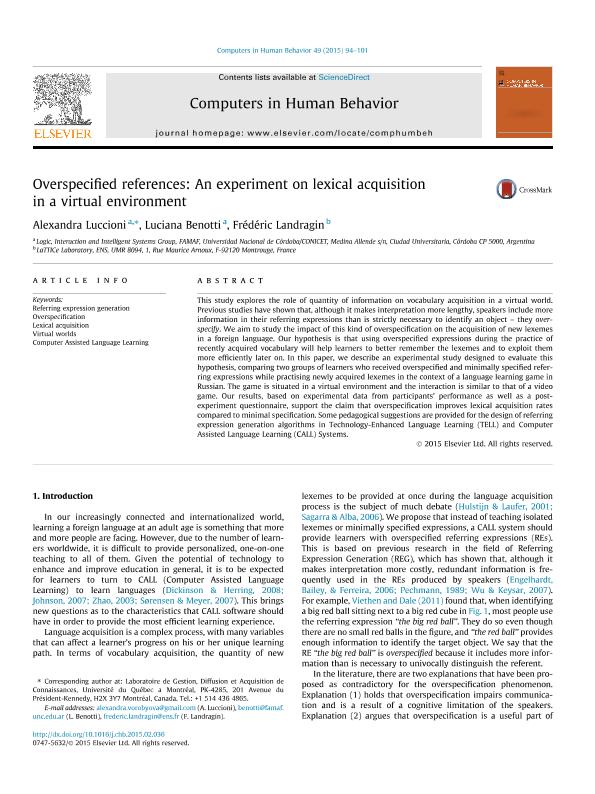Mostrar el registro sencillo del ítem
dc.contributor.author
Luccioni, Alexandra
dc.contributor.author
Benotti, Luciana

dc.contributor.author
Landragin, Frédéric
dc.date.available
2019-02-04T18:36:34Z
dc.date.issued
2015-08
dc.identifier.citation
Luccioni, Alexandra; Benotti, Luciana; Landragin, Frédéric; Overspecified references: An experiment on lexical acquisition in a virtual environment; Elsevier Ltd; Computers in Human Behavior; 49; 8-2015; 94-101
dc.identifier.issn
0747-5632
dc.identifier.uri
http://hdl.handle.net/11336/69335
dc.description.abstract
This study explores the role of quantity of information on vocabulary acquisition in a virtual world. Previous studies have shown that, although it makes interpretation more lengthy, speakers include more information in their referring expressions than is strictly necessary to identify an object - they overspecify. We aim to study the impact of this kind of overspecification on the acquisition of new lexemes in a foreign language. Our hypothesis is that using overspecified expressions during the practice of recently acquired vocabulary will help learners to better remember the lexemes and to exploit them more efficiently later on. In this paper, we describe an experimental study designed to evaluate this hypothesis, comparing two groups of learners who received overspecified and minimally specified referring expressions while practising newly acquired lexemes in the context of a language learning game in Russian. The game is situated in a virtual environment and the interaction is similar to that of a video game. Our results, based on experimental data from participants' performance as well as a post-experiment questionnaire, support the claim that overspecification improves lexical acquisition rates compared to minimal specification. Some pedagogical suggestions are provided for the design of referring expression generation algorithms in Technology-Enhanced Language Learning (TELL) and Computer Assisted Language Learning (CALL) Systems.
dc.format
application/pdf
dc.language.iso
eng
dc.publisher
Elsevier Ltd
dc.rights
info:eu-repo/semantics/openAccess
dc.rights.uri
https://creativecommons.org/licenses/by-nc-sa/2.5/ar/
dc.subject
Computer Assisted Language Learning
dc.subject
Lexical Acquisition
dc.subject
Overspecification
dc.subject
Referring Expression Generation
dc.subject
Virtual Worlds
dc.subject.classification
Ciencias de la Computación

dc.subject.classification
Ciencias de la Computación e Información

dc.subject.classification
CIENCIAS NATURALES Y EXACTAS

dc.title
Overspecified references: An experiment on lexical acquisition in a virtual environment
dc.type
info:eu-repo/semantics/article
dc.type
info:ar-repo/semantics/artículo
dc.type
info:eu-repo/semantics/publishedVersion
dc.date.updated
2019-02-04T13:17:01Z
dc.journal.volume
49
dc.journal.pagination
94-101
dc.journal.pais
Estados Unidos

dc.description.fil
Fil: Luccioni, Alexandra. Universidad Nacional de Córdoba. Facultad de Matemática, Astronomía y Física. Sección Ciencias de la Computación; Argentina
dc.description.fil
Fil: Benotti, Luciana. Consejo Nacional de Investigaciones Científicas y Técnicas. Centro Científico Tecnológico Conicet - Córdoba; Argentina. Universidad Nacional de Córdoba. Facultad de Matemática, Astronomía y Física. Sección Ciencias de la Computación; Argentina
dc.description.fil
Fil: Landragin, Frédéric. Ecole Normale Supérieure; Francia
dc.journal.title
Computers in Human Behavior
dc.relation.alternativeid
info:eu-repo/semantics/altIdentifier/doi/https://doi.org/10.1016/j.chb.2015.02.036
dc.relation.alternativeid
info:eu-repo/semantics/altIdentifier/url/https://www.sciencedirect.com/science/article/pii/S0747563215001454
Archivos asociados
